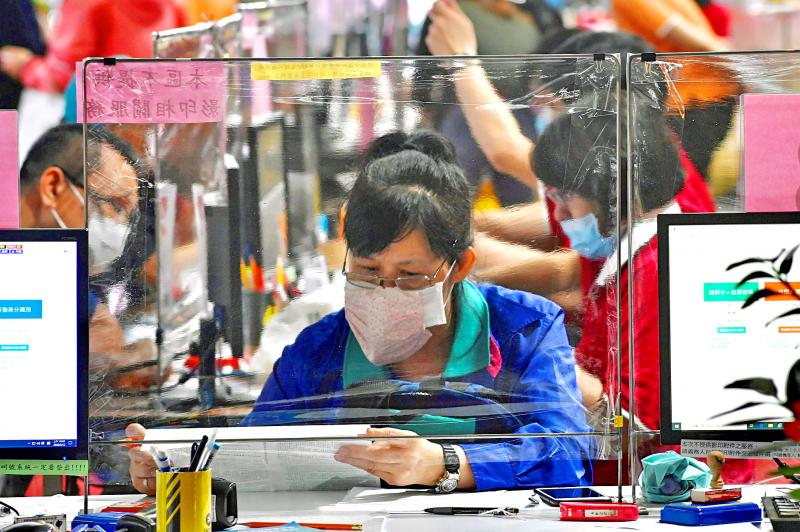The Ministry of Finance yesterday said it collected NT$119.1 billion (US$3.98 billion) in tax revenue last month, an increase of 6.1 percent from a year earlier, bolstered by larger securities transactions and dividend payouts.
The overall gains in tax revenue came even though business activity and housing deals slackened amid the COVID-19 pandemic.
“Trading on the local bourse is vibrant this year, allowing securities transaction tax revenue to post growth for seven months straight,” Department of Statistics Deputy Director-General Chen Yu-feng (陳玉豐) said.

Photo: AFP / Sam Yeh
Stock transactions generated NT$9.4 billion in tax revenue, jumping 12.5 percent from a year earlier, with average daily turnover rising 21.19 percent from NT$155.2 billion to NT$186.4 billion last month, Chen said.
Like other stock markets worldwide, Taiwanese equity markets have seen wild swings, but reclaimed most of their losses to the COVID-19 outbreak, as local tech firms have benefited from remote working and learning arrangements, which boosted demand for laptops, tablets and information technology devices.
For the first four months of this year, stock transactions rose to a new high since the global financial crisis in 2009, Chen said.
Personal income tax revenue surged 49.5 percent to NT$29.3 billion last month, attributable primarily to the quarterly distribution of cash dividends by Taiwan Semiconductor Manufacturing Co (台積電), the world’s largest contract chipmaker.
The ministry has voiced misgivings about the continued upturn in income tax revenue, as it has pushed back the deadline by one month for personal income tax filings this year from May 31 to June 30.
It would be better to make a final judgement after the dust settles, Chen said.
His warning came after corporate income tax revenue and business tax revenue both slipped into negative territory.
Chen pinned the blame on diminished economic activity and an oil price rout, which wreaked havoc on duties from imports of oil, chemical and mineral products.
Business tax revenue might fare worse this month, which reflects partial data for last month, Chen said.
The virus outbreak also weighed on property transactions. Revenue from land value increase tax last month declined 10.7 percent to NT$7.5 billion, with the number of deals shrinking 5.6 percent to 46,545, the ministry said in a report.
Cumulative property transactions totaled 187,121 cases from January to last month, falling 3.4 percent from the same period last year, it said.
However, liquor and tobacco tax revenue held firm with a 6.8 percent increase to NT$5.6 billion, despite a decline in dinner gatherings.
The ministry collected NT$519.6 billion of tax revenue in the first four months, an increase of 9.2 percent from a year earlier and ahead of its budget schedule by 8.6 percent.

MULTIFACETED: A task force has analyzed possible scenarios and created responses to assist domestic industries in dealing with US tariffs, the economics minister said The Executive Yuan is tomorrow to announce countermeasures to US President Donald Trump’s planned reciprocal tariffs, although the details of the plan would not be made public until Monday next week, Minister of Economic Affairs J.W. Kuo (郭智輝) said yesterday. The Cabinet established an economic and trade task force in November last year to deal with US trade and tariff related issues, Kuo told reporters outside the legislature in Taipei. The task force has been analyzing and evaluating all kinds of scenarios to identify suitable responses and determine how best to assist domestic industries in managing the effects of Trump’s tariffs, he

TIGHT-LIPPED: UMC said it had no merger plans at the moment, after Nikkei Asia reported that the firm and GlobalFoundries were considering restarting merger talks United Microelectronics Corp (UMC, 聯電), the world’s No. 4 contract chipmaker, yesterday launched a new US$5 billion 12-inch chip factory in Singapore as part of its latest effort to diversify its manufacturing footprint amid growing geopolitical risks. The new factory, adjacent to UMC’s existing Singapore fab in the Pasir Res Wafer Fab Park, is scheduled to enter volume production next year, utilizing mature 22-nanometer and 28-nanometer process technologies, UMC said in a statement. The company plans to invest US$5 billion during the first phase of the new fab, which would have an installed capacity of 30,000 12-inch wafers per month, it said. The

Taiwan’s official purchasing managers’ index (PMI) last month rose 0.2 percentage points to 54.2, in a second consecutive month of expansion, thanks to front-loading demand intended to avoid potential US tariff hikes, the Chung-Hua Institution for Economic Research (CIER, 中華經濟研究院) said yesterday. While short-term demand appeared robust, uncertainties rose due to US President Donald Trump’s unpredictable trade policy, CIER president Lien Hsien-ming (連賢明) told a news conference in Taipei. Taiwan’s economy this year would be characterized by high-level fluctuations and the volatility would be wilder than most expect, Lien said Demand for electronics, particularly semiconductors, continues to benefit from US technology giants’ effort

‘SWASTICAR’: Tesla CEO Elon Musk’s close association with Donald Trump has prompted opponents to brand him a ‘Nazi’ and resulted in a dramatic drop in sales Demonstrators descended on Tesla Inc dealerships across the US, and in Europe and Canada on Saturday to protest company chief Elon Musk, who has amassed extraordinary power as a top adviser to US President Donald Trump. Waving signs with messages such as “Musk is stealing our money” and “Reclaim our country,” the protests largely took place peacefully following fiery episodes of vandalism on Tesla vehicles, dealerships and other facilities in recent weeks that US officials have denounced as terrorism. Hundreds rallied on Saturday outside the Tesla dealership in Manhattan. Some blasted Musk, the world’s richest man, while others demanded the shuttering of his